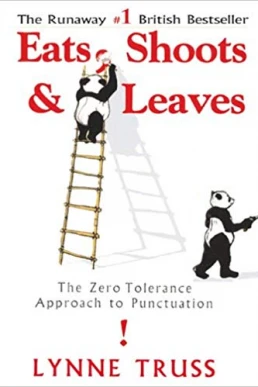Downloading Eats, Shoots & Leaves: The Zero Tolerance Approach to Punctuation

We all know the basics of punctuation. Or do we? A look at most neighborhood signage tells a different story. Through sloppy usage and low standards on the internet, in email, and now text messages, we have made proper punctuation an endangered species. In Eats, Shoots & Leaves, former editor Lynne Truss dares to say, in her delightfully urbane, witty, and very English way, that it is time to look at our commas and semicolons and see them as the wonderful and necessary things they are. This is a book for people who love punctuation and get upset when it is mishandled. From the invention of the question mark in the time of Charlemagne to George Orwell shunning the semicolon, this lively history makes a powerful case for the preservation of a system of printing conventions that is much too subtle to be mucked about with. **
From Publishers Weekly
Who would have thought a book about punctuation could cause such a sensation? Certainly not its modest if indignant author, who began her surprise hit motivated by "horror" and "despair" at the current state of British usage: ungrammatical signs ("BOB,S PETS"), headlines ("DEAD SONS PHOTOS MAY BE RELEASED") and band names ("Hear'Say") drove journalist and novelist Truss absolutely batty. But this spirited and wittily instructional little volume, which was a U.K. #1 bestseller, is not a grammar book, Truss insists; like a self-help volume, it "gives you permission to love punctuation." Her approach falls between the descriptive and prescriptive schools of grammar study, but is closer, perhaps, to the latter. (A self-professed "stickler," Truss recommends that anyone putting an apostrophe in a possessive "its"-as in "the dog chewed it's bone"-should be struck by lightning and chopped to bits.) Employing a chatty tone that ranges from pleasant rant to gentle lecture to bemused dismay, Truss dissects common errors that grammar mavens have long deplored (often, as she readily points out, in isolation) and makes elegant arguments for increased attention to punctuation correctness: "without it there is no reliable way of communicating meaning." Interspersing her lessons with bits of history (the apostrophe dates from the 16th century; the first semicolon appeared in 1494) and plenty of wit, Truss serves up delightful, unabashedly strict and sometimes snobby little book, with cheery Britishisms ("Lawks-a-mussy!") dotting pages that express a more international righteous indignation.
Copyright © Reed Business Information, a division of Reed Elsevier Inc. All rights reserved.
From Booklist
This impassioned manifesto on punctuation made the best-seller lists in Britain and has followed suit here. Journalist Truss gives full rein to her "inner stickler" in lambasting common grammatical mistakes. Asserting that punctuation "directs you how to read in the way musical notation directs a musician how to play," Truss argues wittily and with gusto for the merits of preserving the apostrophe, using commas correctly, and resurrecting the proper use of the lowly semicolon. Filled with dread at the sight of ubiquitous mistakes in store signs and headlines, Truss eloquently speaks to the value of punctuation in preserving the nuances of language. Liberally sprinkling the pages with Briticisms ("Lawks-a-mussy") and moving from outright indignation to sarcasm to bone-dry humor, Truss turns the finer points of punctuation into spirited reading. Joanne Wilkinson
Copyright © American Library Association. All rights reserved
